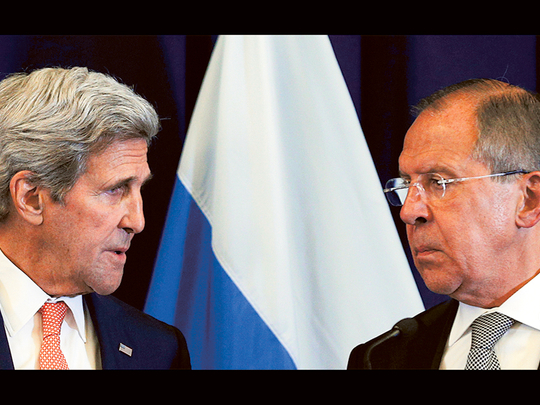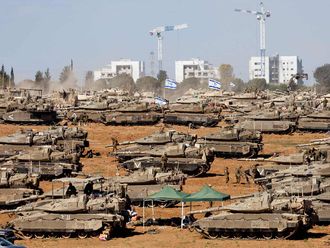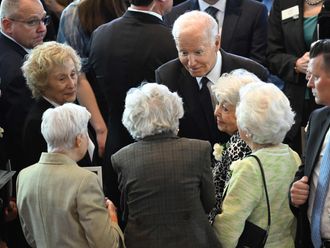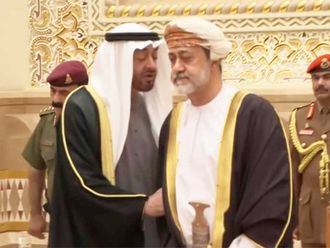
Beirut: Since it was made public on September 9, the US-Russian deal has set off a wave of controversy in Syria. Five days after the agreement was announced in Switzerland by US Secretary of State John Kerry and Russian Foreign Minister Sergei Lavrov, its full text has not yet been revealed by either Washington or Moscow and, yet, it has been warmly received by Damascus officialdom, while Syrian TV gave it prime and favourable coverage.
The Syrian opposition is worried that something suspicious might have been agreed on at their expense by the two superpowers. Since then, two developments have emerged, lending credence to their worries.
When first announced on September 9, the deal reportedly prohibited the Syrian Air Force from firing at will at positions held by the armed Syrian opposition.
On Monday, however, John Kerry raised eyebrows when speaking to journalists at the State Department by saying: “[Syrian President Bashar] Al Assad is not supposed to be bombing the opposition, because there is a ceasefire, but he is allowed to target Al Nusra [in] strikes that are agreed upon with Russia and the United States.”
This was the first time that a senior US official had hinted at possible cooperation and coordination between his army and that of Syria.
Kerry’s statement was read in Damascus as a green light to strike at opposition groups that Syria claims are either affiliated or infiltrated by Al Nusra — a very loose term that can be interpreted in so many different ways on the Syrian battlefield.
It can certainly be used to strike at everybody and everything that Damascus and Moscow claim to be working with Al Nusra, just like the Russians have been doing since they joined the Syrian battlefield last September.
A State Department spokesman came out to deny his boss’ statement, claiming that there were no provisions under the US-Russian deal that authorise Syrian bombing of rebel positions.
“This is something we could never envision doing” said State Department spokesman John Kirby.
Kerry’s statement and the rebuttal by the Department of State added more murkiness to the controversial US-Russian deal, which has not yet been officially presented in written form to the Riyadh-backed Higher Negotiating Council.
From what has been revealed so far, there is no indication about a political process, as specified by UNSCR 2254, and makes no mention of the ‘Transitional Government Body’ that was called for in Geneva during the summer of 2012. Additionally, it says nothing about presidential elections, the right of return of Syrian refugees, the fate of detainees in Syrian prisons, or the future of Al Assad.
On Tuesday, more controversy was aroused, whenLavrov, speaking at a press conference with his Luxembourgian counterpart Jean Asselborn, said confidentiality of the deal came at the request of Kerry.
Lavrov called for translating the deal into a UN Resolution and “not keeping it secret, as Washington wants”.
He was hinting that something about the deal was embarrassing for the United States, and that Kerry wanted it to remain confidential — for now.
In Damascus, many are hoping that Kerry has finally surrendered to Lavrov’s position on Al Assad, a fear that is shared within the upper echelons of the Syrian opposition in Istanbul and Riyadh.












